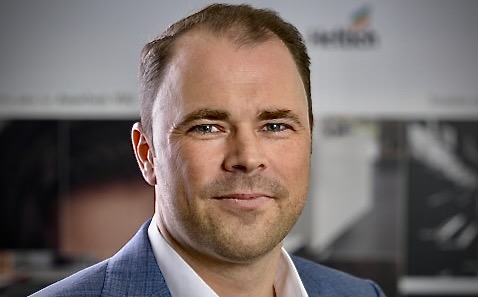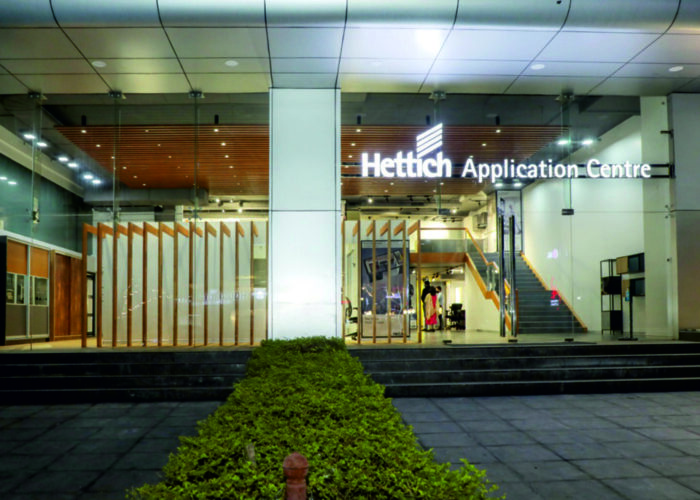India chief Andre Eckholt says that Hettich is making in India for the world to build on its leadership position and maintain global competitiveness.
Managing directors of thirty Hettich subsidiaries from across the world came down to view the company’s new hinge factory in Indore when it went online in 2021. The factory is a state-of-the-art automated assembly line, equipped with specialised machines made by Hettich’s in-house tech division besides other top-of-the-line equipment from Europe.
At the end of the visit, the common sentiment was ‘wow’. Each of the leaders returned with a newfound respect for Indian capabilities, and the confidence that Hettich India would play a big role in the brand’s global business. The message that went out was that Hettich is making in India, for the world.
Andre Eckholt, Hettich India’s new managing director who took over the reins at the beginning of 2023, asserts that there are nuances to the ‘Make in India for the World’ story.
“We are a global company which aims to be a local player. We have a long-term view of the market and are systematically expanding our footprint.”
Eckholt is referring to the investments Hettich has made in India since it started as a trading operation in 2001. Its first plant came up in Vadodara in 2013 for Cargo wire baskets, followed by a telescopic slides plant in 2015. This was followed by the Indore hinge factory in 2021. The company has invested close to Rs 600 crore in the India ops.
“We have plans to invest Rs 700 crore over the next five years in new production facilities so that we can widen our portfolio. We started with 100 per cent imports. But now, besides feeding the growing domestic market, our export ratio is increasing with each passing year. Already we are manufacturing the entire family of wire products and telescopic slides in India.”
Hettich’s push for deeper roots in India is driven by two factors, says Eckholt. “First, we wish to build on our leadership position in this market. We have noted three megatrends that are shaping India – individualisation, urbanisation, and digitalisation. We are responding to these trends by being an agile and local organisation while leveraging our 134-year German legacy.”
Over the past two decades, Hettich has built a formidable organisation of over 2,000 and a distribution network that spans the country. This is supported by a chain of 12 application centres, where customers can experience the brand and its latest solutions. Unlike in Europe where Hettich is not a consumer-facing brand, in India it operates on a retail-first model. It has top-of-the-mind recall due to the significant brand-building campaigns it has undertaken. Watch a cricket match, or catch a flight, Hettich is conspicuous by its presence.
“We observe the consumers of furniture very closely. We go to their homes to see how they live and use their spaces. The people in India are ambitious, they are eager to learn and grow. They take to technology with ease and like to innovate. We understand these traits and aim to serve them with solutions that save time, improve the functionality of furniture, and enhance user experience.”
Hettich recognises that the Indian demographic is dominated by millennials and gen Z, who make up 52 per cent of the population. Their desire to live in urban spaces is causing a steady migration towards cities and towns. A majority of them are nuclear families, which spend 30 per cent more per capita than joint families. Their living spaces are smaller as compared to their non-urban homes, and must also adapt to the need to work from home. They want personalised interiors and seek signature styles and choices. This calls for furniture that is space-efficient, embedded with technology and multi-functional.
Eckholt says that the profile of Hettich India’s team is a reflection of the country’s consumer profile. “Our team is young and ambitious. A growing percentage among them are from design and technology backgrounds, and this talent enables us to understand our customers better. We are a Great Place to Work organisation. As a result, we have low attrition and consistently attract talent.”

The other factor shaping Hettich’s India journey is the need to safeguard the business from uncertainties and remain competitive. “Covid disrupted the supply chain of nearly every organisation on the globe. Now the Ukraine-Russia war has become a cause of business risk. Ukraine is a major source of steel for Hettich, and the war has impacted us significantly. Costs of raw materials and energy have gone up. China no longer offers a cost advantage. We need to maintain our cost competitiveness without compromising on quality. Our investments in India will enable us to de-risk our operations.”
By sourcing raw materials locally, Hettich India has a fair cost advantage as compared to its sister companies in other countries. It has started feeding several Hettich markets in European countries, the USA and the SAARC region. In 2021 it started supplying auto close and soft close hinges to China. In fact, the Indore hinge plant is the largest in the Hettich world.
This is encouraging Hettich Group to invest more in expanding capacities and producing for its global markets. Eckholt says that Hettich was one of the prominent corporates to commit new investments at the recently concluded Global Investors Summit – Invest Madhya Pradesh 2023.
“We are hoping that the central government will announce incentives to encourage the growth of the furniture and fittings industry in India. Among them is the formalisation of the Production Linked Incentive scheme for attracting investment in the sector. Other policy measures we hope for include notification of incentives for export of furniture fittings as announced in 2022, subsidy to units that are set up in furniture parks, and tax benefit to new furniture units.”

Hettich has set sustainability goals of becoming carbon neutral by 2030. This applies to its Indian operations as well. “We have only one planet to leave for our next generation. We must therefore take our responsibility for mitigating climate change seriously. Besides, our big customers require us to match their sustainability commitments. Our investment in solar plants at our factories has ensured that 30 per cent of our energy needs are met through renewable sources, and we aim to do more. We are also in the process of transforming our fleet of vehicles to electric. Our beach cleaning drives in Mumbai are a means to sensitise our teams about being responsible towards the environment.”
ALSO READ: The Kitchen Business is in Trend
Eckholt first came to India in 2013, when he was tasked with setting up Hettich’s wire plant in Vadodara. During the months he spent here, he says he fell in love with the people, the food, and the culture. “My love for India has brought me back to this country. I just could not let go of this opportunity to work in India again. The team that I have inherited is highly motivated and I feel inspired being in their company. I feel that together we are in the process of shaping the industry and making a difference to the Hettich world globally.”
Andre Eckholt will be speaking at the India Kitchen Congress on April 6.


